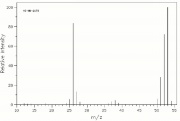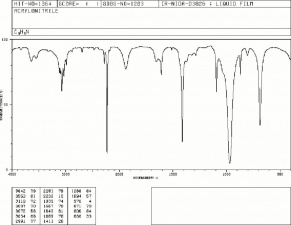Acrylonitrile
Jump to navigation
Jump to search
Description
A clear, colorless liquid. Acrylonitrile is the monomer used for many acrylic and modacrylic fibers (see Acrylic fiber). It is also widely used as a copolymer. Acrylonitrile is copolymerized with butadiene to produce Nitrile rubber. It is an important component in the tough resilient rubber mixtures of ABS (acrylonitrile-butadiene-styrene) and SAN (Styrene-acrylonitrile). Acrylonitrile is used as an Insecticide.
See also Polyacrylonitrile.
Synonyms and Related Terms
acrilonitrilo (Esp.); cianoetileno (Esp.); 2-propenonitrilo (Esp.); acrylonitrile (Fr.); acrilonitrile (It.); acrilonitrilo (Port.); vinyl cyanide; 2-propenenitrile; cyanoethylene;
Examples: Acritet; Fumigrain; Ventox;
Risks
- Explosive and flammable.
- Toxic by inhalation and skin absorption.
- Suspected carcinogen.
- ThermoFisher: SDS
Physical and Chemical Properties
Soluble in all common organic solvents. Miscible with water.
| Composition | CH2:CHCN |
|---|---|
| CAS | 107-13-1 |
| Melting Point | -83.55 C |
| Density | 0.8060 g/ml |
| Molecular Weight | mol. wt. = 53.06 |
| Refractive Index | 1.3888 |
| Boiling Point | 77.3 C |
Resources and Citations
- G.S.Brady, Materials Handbook, McGraw-Hill Book Co., New York, 1971 Comment: p. 11
- Theodore J. Reinhart, 'Glossary of Terms', Engineered Plastics, ASM International, 1988
- Hoechst Celanese Corporation, Dictionary of Fiber & Textile Technology (older version called Man-made Fiber and Textile Dictionary, 1965), Hoechst Celanese Corporation, Charlotte NC, 1990
- The Merck Index, Martha Windholz (ed.), Merck Research Labs, Rahway NJ, 10th edition, 1983 Comment: entry 133


